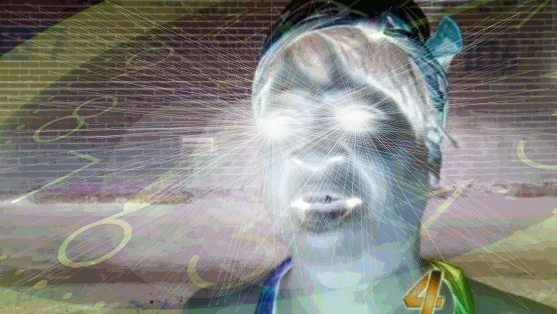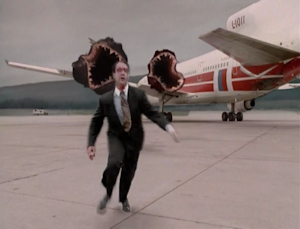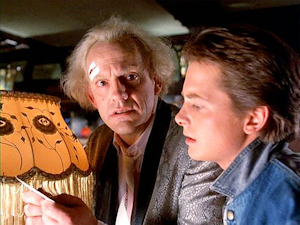
Time is a very curious thing. It consumes every moment of our lives, pun semi-intended. Sometimes we’re out of time, time runs short, we wonder if it’s time yet, we ain’t got time for that…
I think most people don’t really think much about time. After all, who wants to think about the inexorable drumbeat that draws us ever nearer to the veil of our own existence? We all mill about, looking to make the best of the time that we do have, but don’t consider what time really is to begin with.
Those who do consider the subject usually think of time as being the fourth dimension. You have length, width, height. Time is the fourth dimension that the three other dimensions exist within. Kind of makes sense, I suppose.
The problem is that if you ask a mathematician, they’ll call bull. It turns out that equations can be solved without time being taken into consideration. So from a mathematical perspective, time doesn’t exist.
So that brings up the question about how time runs at different speeds for different people. One of the fun facts about NASA’s Twins Study is that Mark Kelly is now another five milliseconds older than his brother Scott thanks to travelling far faster than him while he was on the space station. This is called time dilation, and no one seems to understand it very well.
That’s the most confusing thing about time. Everyone experiences it, experiences the effects of it, but it seems supremely difficult to quantify it. While it’s easy enough to mark its passing — with seconds, minutes, hours — it seems nearly impossible to accurately describe it in any meaningful way.
The confusion multiplies when you consider the mind-numbing concepts of the past and the future. Now, I know those two concepts seem simple. It’s when you start asking questions about those concepts that your brain starts hurting.
Take the past, for example. The past is what has stopped being the present. Everything that you have done is now in the past. Kindergarten stuff, right?
But what happens to the past?

Is the past still tangible? Is there someway to go back in time? (You knew that was coming.) If you went back in time, could you interact with the past? Or would it just be like a three-dimensional movie? Would it be like the Langoliers? And if it is, oh my god that’s horrible, run?
So the general consensus seems to be that it’s impossible to go back in time for a couple of reasons. One is more scientific than the other. We’ll start with that one.
As mentioned earlier, time can be slowed down for an individual if they go faster than everyone else(a gross simplification but, you know, this is an entertainment website.) This means that if you go near the speed of light, you “travel” through time faster than everyone else, therefore staying young and beautiful while everyone else turns to dust, etc. So what if you reached the speed of light?
In theory, time itself would stop. Therefore, surpassing the speed of light would result in time running backwards for you, right? But that’s not what happens on Star Trek!
The thing is, Star Trek is a work of fiction. I know, I was bummed out too. But also, as far as anyone can see, one can’t even reach the speed of light, much less surpass it. So that’s that, right?
Well, maybe… This brings in the idea of wormholes, those wonderful tears in space and time. They allow a proposed starship to travel from one end of the universe to the other before light even ties its sneakers. You’d have to take some Enterprise-sized leaps in logic for wormholes to even exist, though.
First of all, despite scientists’ best efforts, it’s like really hard to rip a hole in reality, you guys. The universe seems really keen to stitch any evident holes back together within milliseconds of their appearance. But let’s pretend that’s not an issue.
So let’s pretend they can stay open, and be large enough for a starship to navigate through. Okay, yeah, you beat light particles to your destination… So, what? You can beat your brother to your grangran’s house if you take a shortcut on the back roads, but that doesn’t mean you arrive last Tuesday, does it? So it goes for beating the light to your destination.
Alright, so what about travelling to the future, you say? The above information pretty much proves that’s a possibility, right? Yup! The end!
Okay, not really. In order to get significantly ahead of everyone else in the time game, you have to approach the speed of light. That’s no mean feat. It would also take a long time to accelerate and decelerate, if you didn’t want to turn into a greasy splatter. Thus, much of the benefits of time travel would be negated.
Speaking of benefits, what would you benefit, travelling to the future? You don’t know what the future holds, but you do know that everyone you ever knew and loved would be like, so totally dead. World War III could be raging, super-herpes could be spreading everywhere, a childlike megalomaniac that used to be a TV personality could be president… And there would be no way to return to the past, remember?
So the past might as well might not exist. We can “travel” to the future, but it’s really just like fast-forwarding. So just what the hell is time, then?

The bottom line is… time might not even exist.
It kind of makes sense if you stop to think about it. You exist now. The future doesn’t exist yet because it’s now. The past doesn’t exist anymore because the past is no longer now.
Everything you ever do in your life you do in the present. Sure, you have pictures and memories of your fifth birthday party, but only because those memories and pictures exist… wait for it… now. You don’t have memories or pictures of the future because the future doesn’t exist yet, simply because it’s not now yet.
It’s a somewhat complex thing for humans to wrap their head around. After all, nobody wants to think that the warm memories they have of the past are lost forever. That is at the very heart of time travel theory, I think: The drive to reconnect with the things in our lives that made a difference.
If there’s a lesson to be learned in all of this, it’s to live in the moment. Remember that the past can never be changed, and the future will never truly be here. All you have is now. Make the most of it… while you still have time.
